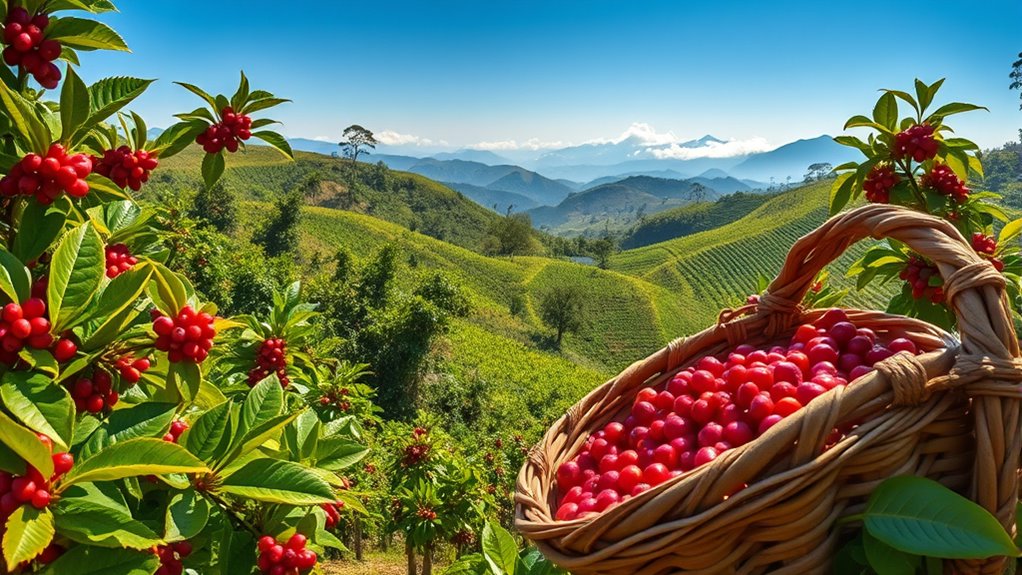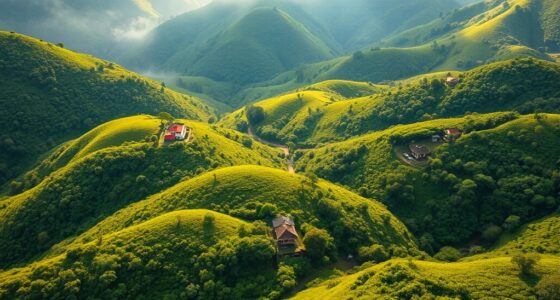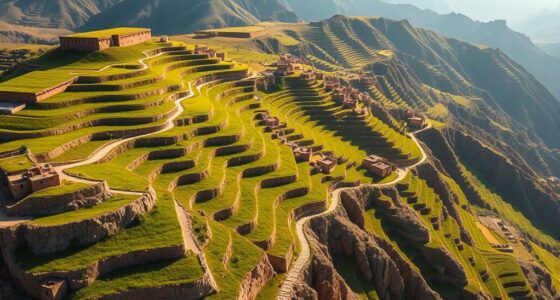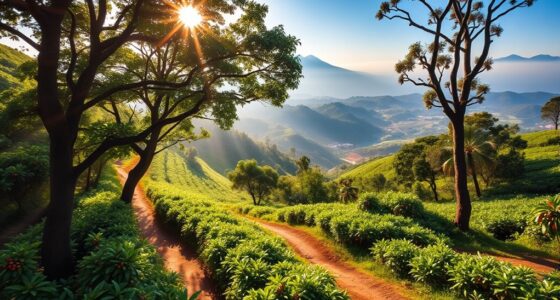Kenyan coffee from Nyeri, Kirinyaga, and Embu is known for its vibrant acidity, full-bodied profile, and complex floral and fruity notes. These regions benefit from high altitudes, volcanic soils, and ideal climates, which help produce high-quality beans. Sustainable practices like shading and organic fertilization improve flavor and protect the environment. If you want to discover more about what makes these coffees exceptional, there’s plenty more to explore.
Key Takeaways
- Nyeri, Kirinyaga, and Embu are renowned Kenyan coffee regions known for high-altitude, volcanic soils, and favorable climate conditions.
- Kenyan coffee from these areas features vibrant acidity, full body, and complex floral and fruity aromas.
- Processing primarily involves washed techniques, which enhance the bright, clean flavor profile of the coffee.
- Sustainable practices like shade growing, organic fertilization, and water conservation are widely adopted locally.
- Quality is maintained through careful hand harvesting, strict standards, and regional expertise, ensuring high-quality coffee production.
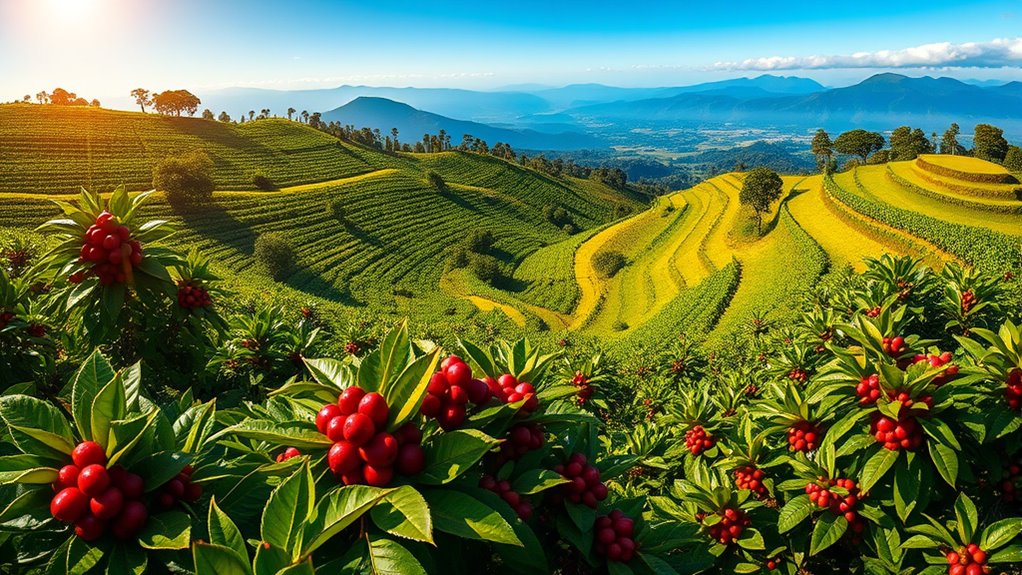
Are you curious about what makes Kenyan coffee world-renowned? The secret lies in the meticulous methods of coffee processing and a strong commitment to sustainable farming practices. Kenyan coffee is celebrated for its vibrant acidity, full-bodied flavor, and complex aroma, which are the results of carefully managed cultivation and processing techniques. When you visit regions like Nyeri, Kirinyaga, and Embu, you’ll see firsthand how farmers and processors work together to produce exceptional coffee that stands out on the global stage.
Kenyan coffee’s vibrant acidity and rich aroma result from meticulous processing and sustainable farming.
Coffee processing in these regions is a critical step that influences the final taste. Most farmers rely on the washed or wet processing method, which involves pulping the cherries soon after harvest, fermenting them to remove mucilage, and then thoroughly washing the beans before drying. This process enhances the coffee’s bright, clean flavors and highlights the fruitiness and floral notes that Kenyan coffee is known for. The attention to detail during processing is essential; it ensures that only ripe cherries are picked, and that each step is executed precisely to preserve the beans’ quality. Such dedication results in a consistent product that meets high international standards, making Kenyan coffee highly sought after worldwide.
Sustainable farming is at the heart of Kenya’s coffee industry. Many farmers adopt eco-friendly practices like shade growing, organic fertilization, and water conservation to protect their land for future generations. These methods help maintain soil health, reduce the use of harmful chemicals, and promote biodiversity on farms. By engaging in sustainable farming, farmers not only improve the quality of their coffee but also support environmental health and community well-being. Many cooperatives and organizations assist farmers in implementing these practices, providing training and resources to ensure that their operations are both productive and sustainable. When you taste Kenyan coffee, you’re experiencing the result of these efforts—coffee that’s grown with care for the land and the people who nurture it.
In regions like Nyeri, Kirinyaga, and Embu, the altitude and climate create ideal conditions for coffee cultivation. The high elevations and rich volcanic soils help produce beans with the distinct flavor profiles that define Kenyan coffee. Farmers here often harvest their cherries by hand, selecting only the ripest ones, which ensures superior quality. The combination of traditional methods and innovative sustainable practices makes Kenyan coffee truly unique. So, as you enjoy a cup of Kenyan coffee, remember that its rich taste is a reflection of the region’s dedication to quality, sustainable farming, and expert processing—elements that keep Kenya at the forefront of the global coffee scene. Additionally, the quality control standards implemented during processing help maintain consistency and high standards across the industry.
Frequently Asked Questions
What Is the Best Time of Year to Visit Coffee Farms in Kenya?
You should visit coffee farms during the dry season, typically from June to October and January to February. During these times, seasonal harvests are in full swing, and the weather patterns are more predictable, making it easier to explore and enjoy the scenery. Avoid the rainy seasons when heavy rains can disrupt farm activities and sightseeing. Planning your visit around these periods guarantees a richer, more enjoyable experience.
How Do Local Farmers Ensure Sustainable Coffee Farming Practices?
You can see local farmers guarantee sustainable coffee practices by focusing on organic certification, which promotes eco-friendly methods and avoids harmful chemicals. They also prioritize water conservation through efficient irrigation and rainwater harvesting techniques. These practices help protect the environment, maintain soil health, and support the long-term viability of coffee farming. By adopting these methods, farmers contribute to sustainable agriculture while producing high-quality coffee for consumers like you.
Are There Any Special Coffee Varieties Unique to Nyeri, Kirinyaga, or Embu?
Think of coffee like a classic jukebox—each region has its own special tune. In Nyeri, Kirinyaga, and Embu, you’ll find indigenous varieties and specialty beans unique to these areas. These varieties thrive in the rich volcanic soils, giving the coffee distinct flavors and aroma profiles. Their uniqueness is celebrated worldwide, making your brew truly one-of-a-kind, and showcasing the rich heritage of Kenya’s coffee heritage.
Can Visitors Participate in Coffee Harvesting or Processing Activities?
Yes, you can participate in coffee harvesting experiences during your visit. Many coffee farms offer immersive farm tours where you can join in coffee harvesting activities and see the processing firsthand. These experiences let you learn about the coffee-making process, pick ripe cherries, and understand the farm’s cultivation methods. It’s a great way to connect with the local culture and enjoy an authentic coffee farm adventure.
What Are the Health Benefits of Consuming Kenyan Coffee?
You might be surprised, but Kenyan coffee offers more than just great flavor. Its rich coffee antioxidants help fight free radicals, supporting your overall health. Plus, moderate consumption can boost heart health by improving blood flow and reducing risks. When you enjoy Kenyan coffee, you’re not only savoring a delicious beverage but also tapping into health benefits that could enhance your well-being every day.
Conclusion
As you explore Kenya’s coffee regions like Nyeri, Kirinyaga, and Embu, you’ll discover a landscape as rich and vibrant as the coffee beans themselves. Each area offers a unique taste of Kenyan heritage and dedication, brewing a cup that’s as bright and invigorating as a morning sunrise. So, immerse yourself in these lush highlands, embrace the flavors, and let Kenya’s coffee journey awaken your senses, much like a fresh breeze awakening a sleepy town.
